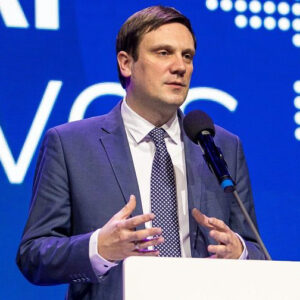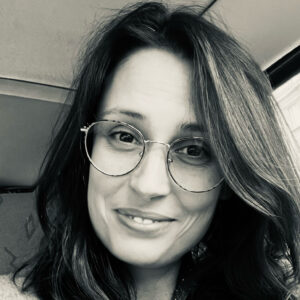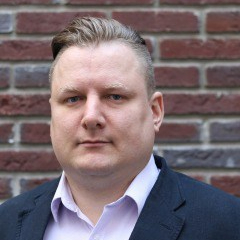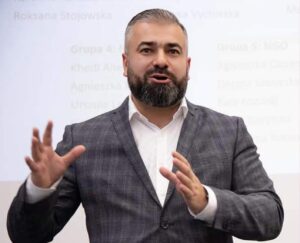 Migration Challenges in Europe: current and future pathways for policies and practice (EN)
Migration Challenges in Europe: current and future pathways for policies and practice (EN)
Amidst the complexities of the ongoing refugee crisis in Central and Eastern Europe, this vital session delves into the migration challenges in the EU, examining policies and local practices at both European and local levels.
In cooperation with Heinrich Böll Stiftung Warsaw.
Speakers
 Tomas Tomilinas – Union of Democrats “For Lithuania”
Tomas Tomilinas – Union of Democrats “For Lithuania”
Educated in political science, Tomas Tomilinas is a green social activist, trade union organizer and member of Lithuanian Parliament from 2016. He is a co-founder and vice-chair of the new green-oriented political party of Democrats. Experienced in implementing socio-economic reforms, active on environment, human rights, migration and regional development. He is an author of the book, where he provides deconstruction of main obstacles for building real welfare state, rooted in Lithuanian political discourse and crucial in preventing social justice and progress. These myths include unprecedented public trust in free market, lack of humanistic adult education and special king of post-soviet neoliberalism.

Marta Górczyńska – Helsinki Foundation for Human Rights
Marta Górczyńska is a human rights lawyer working as the head of the Migration Department at the Helsinki Foundation for Human Rights in Warsaw. She provides legal aid to migrants, carries out strategic litigation, monitors the situation at the borders and in the detention facilities for migrants, and reports on human rights violations. She provides legal expertise for international organizations and European institutions such as UNHCR, EU Fundamental Rights Agency and European Parliament. She advocates for human rights-based approach for migration and global responsibility sharing. Since 2021, she has been actively involved in bringing legal assistance to migrants crossing the Poland-Belarus border, being one of the co-initatiors of Grupa Granica. She is a PhD candidate at the University of Warsaw, focusing her academic research on access to asylum at the external European borders and externalisation policies. She was recently a visiting researcher at the University of California in Los Angeles (UCLA) and visited US-Mexico border. In 2022, she was awarded the Human Rights Award by the German organisation Pro Asyl.
 Elżbieta Mirga-Wójtowicz – Centre of Migration Research, University of Warsaw
Elżbieta Mirga-Wójtowicz – Centre of Migration Research, University of Warsaw
Dr. Elżbieta Mirga-Wójtowicz is a cultural animator, political scientist and researcher, and a graduate of the Jagiellonian University. She works as an assistant professor at the Center for Migration Research at the University of Warsaw. She has nearly 15 years of experience in government administration, implementing state policy towards ethnic and national minorities, as well as coordinating the implementation of Roma integration policy in Poland. In the years 2008-2014, she served as the Plenipotentiary of the Małopolska Voivode for National and Ethnic Minorities. She is the author of evaluation reports for the European Commission under the Roma Civil Monitor (2017-2020) and Roma Civil Monitor II (2021-2025) projects. She is also the author of scientific and popular science articles on Roma topics. For 12 years he has been co-organizing the “Dikh He Na Bister” project commemorating the Holocaust of the Roma in cooperation with Ternype. She is also a member of the European Roma Institute for Arts and Culture (ERIAC) and a member of the board of the Jaw Dikh Foundation.
 Sylwia Urbańska – Krytyka Polityczna
Sylwia Urbańska – Krytyka Polityczna
 Moderator: Michał Polakowski- Baltic Dialogue Program Coordinator (Heinrich Böll Stiftung Warsaw)
Moderator: Michał Polakowski- Baltic Dialogue Program Coordinator (Heinrich Böll Stiftung Warsaw)
Michał Polakowski holds a PhD in Public Policy and Policy Analysis from Maastricht University in the Netherlands. He studied political science, political sociology and social policy. Before joining the Heinrich Boll, he was working at the Economic and social Research Institute in Dublin and Poznań University of Economics and Business. Michał has an experience of work in non-governmental sector in Poland and he is the co-founder of International Centre for Research and Analysis. His research interests include various aspects of socio-economic transformation. Since September 2023 he is part of our Team where he leads the Baltic Dialogue Programme focused on enhancing cooperation between the Baltic states in the fields of climate and energy, agriculture, democracy and human rights as well as the security policy.
 Karol Kwiatkowski-Vice-president Centeral Roma Committee
Karol Kwiatkowski-Vice-president Centeral Roma Committee
Vice president of the Central Council of Roma in Poland. Vice President of the International Romani Union – World Roma Organization. For more than 17 years he has been involved in education and economic integration of Roma people. Co-author of many studies and reports on the functioning of the Roma communities in education and the labor market. Since 2004 he has been working on advocacy for Roma Education Assistants. Within the framework of self-advocacy, he strives to build a nationwide system for improving the professional qualifications of REAs. Creator of many studies and reports. Led consultations on the Law on the enactment of August 2 as Roma Holocaust Remembrance Day. Former expert of the European Roma and Travellers Forum at the Council of Europe. Former member of the Team for Roma Affairs at the Ministry of Internal Affairs. Multiculturalism and anti-discrimination trainer.
(PL)
Wiceprezes CRR Wiceprezes Centralnej Rady Romów w Polsce. Wiceprezydent International Romani Union – Światowej Organizacji Romów. Od ponad 17 lat zajmuje się edukacją i integracją ekonomiczną Romów,. Współautor wielu badań i raportów dot. funkcjonowania Romów w edukacji i na rynku pracy. Od 2004 roku pracuje nad rzecznictwem interesów Asystentów Edukacji Romskiej. W ramach samo rzecznictwa dąży do budowy ogólnopolskiego systemu podnoszenia kwalifikacji zawodowych AER. Twórca wielu badań i raportów. Prowadził konsultacje nad Ustawą dotyczącą uchwalenia 2 sierpnia jako Dniem Pamięci o Zagładzie Romów. Były ekspert Eurpean Roma and Travellers Forum przy Radzie Europy. Były członek Zespołu do Spraw Romskich przy MSWiA. Trener wielokulturowości oraz trener antydyskryminacyjny.

